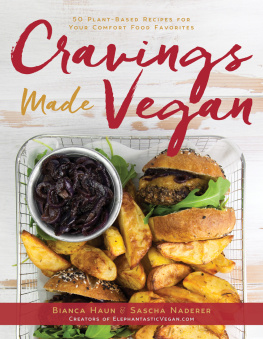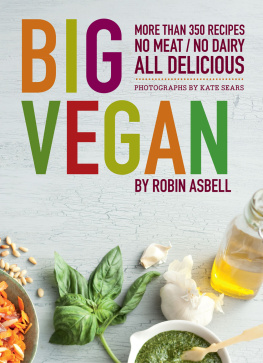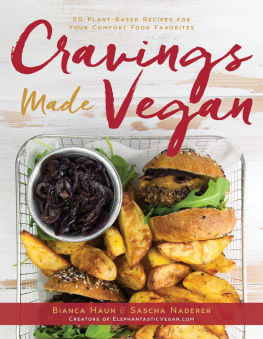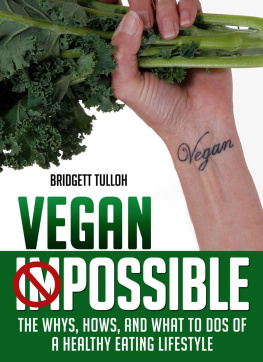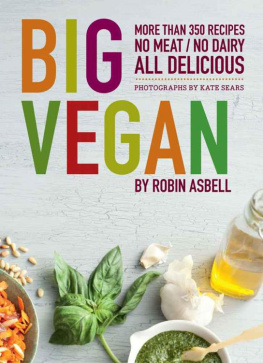
Library of Congress Cataloging-in-Publication Data
Schwegmann, Michelle.
Eat like you give a damn : recipes for the new ethical vegan / Michelle Schwegmann and Josh Hooten.
pages cm
Includes index.
ISBN 978-1-57067-313-9 (pbk.) -- ISBN 978-1-57067-879-0 (e-book)
1. Veganism. 2. Vegan cooking. I. Hooten, Josh. II. Title.
TX392.S375 2015
641.5636--dc23
2015010397
2015 Michelle Schwegmann
Food Photos 2015 Josh Hooten & Michelle Schwegmann
Photographer: Josh Hooten
Food styling: Josh Hooten & Michelle Schwegmann
Cover and interior design: Josh Hooten
Author photo: Amy Gedgaudas
Pictured on front cover: Beet, Lettuce, Tempeh, and Avocado Sandwiches, .
Pictured on back cover: Chopped Salad with Spicy Hot Chickpeas, .
All rights reserved. No portion of this book may be reproduced by any means whatsoever, except for brief quotations in reviews, without written permission from the publisher.
Book Publishing Company
PO Box 99
Summertown, TN 38483
888-260-8458
bookpubco.com
ISBN: 978-1-57067-313-9
Printed in the United States of America
20 19 18 17 16 15 1 2 3 4 5 6 7 8 9
Book Publishing Company is a member of Green Press Initiative. We chose to print this title on paper with 10% postconsumer recycled content, processed without chlorine, which saves the following natural resources:
10 trees
310 pounds of solid waste
4,622 gallons of water
852 pounds of greenhouse gases
4 million BTUs of energy
For more information on Green Press Initiative, visit greenpressinitiative.org .
Environmental impact estimates were made using the Environmental Defense Fund Paper Calculator. For more information visit papercalculator.org .
Printed on recycled paper.

Contents
BY ANONYMOUS
BY VIRGINIA MESSINA, MPH, RD

Rescued piglets, Farm Sanctuary, Watkins Glen, NY.
The Reason
JUNE 29, 2011, was an unremarkable day in central Iowa. A low breeze clung to the earth, bending the tips of cornfields in unison. A cloudless sky pooled loosely around the sun, which dutifully illuminated what little the landscape offered it. Industrial fans, their hum so ubiquitous as to require more effort for the ear to grasp than it does to ignore, continued their charge pulling putrid air from inside thousands of metal sheds that warehoused the living, breathing, feeling bodies we identify as food animals.
Before dawn, I packed the final contents of my hotel room, a dimly lit, single occupancy on the first floor of a Super 8 that had housed my undercover operation for nearly two months. I swung my Jetta south onto Highway 35 and let the dense Iowa air fill my lungs for a few wistful miles before making a hard left onto I-80, straight through to Illinois. By the time I arrived at the headquarters of Mercy for Animals (MFA), perched discreetly above a shoe store on Chicagos north side, the atmosphere in the office was electric. News was traveling quickly that an undercover investigator had gained employment at one of the largest factory pork farms in Iowa and documented cruelty, abuse, neglect, and incompetence so egregious that national grocery store chains had begun cutting ties with the company in light of the release.
The pork industry confines pigs in a way that bears no resemblance to their natural behavior.
Before dawn, I packed the final contents of my hotel room, a dimly lit, single occupancy on the first floor of a Super 8 that housed my undercover operation for nearly two months.
Pigs are curious, intelligent, active animals who live in matriarchal societies of several families. When they are intensively confined with no intellectual or social stimulation, forced to live in their own waste, divorced from their piglets, and subjected to a life in a cage that is barely bigger than their own bodies, they exhibit behavior typical of madness. I witnessed mother sows biting the bars of their cages in frustration and boredom, or rubbing their noses raw and bloody on the metal floor of their cages during attempts to nestanother natural instinct of pigs that farming doesnt allow for. Piglets in stress and boredom will chew the tails of their siblings, a behavior not found in any pig colonies outside the walls of factory farms. Tail biting is such a problem on pig farms that the industry has taken to tail docking, a procedure whereby they cut off the tails of infant piglets. This practice is accomplished with no more than sharp shears and a shot of iron to supplement the blood loss.
In addition to tail docking, Iowa Select was found to be castrating male piglets without anesthesia, commonly resulting in intestinal ruptures and slow death. Pregnant sows were confined in gestation cratescages so small a grown pig cannot lie down, turn around, or escape her own waste for most of her adult life. Gestation crates are considered so cruel that they have been banned in the United Kingdom, New Zealand, and Australia, and in several US states, including Florida and California. With the release of MFAs investigation, pork industry leaders came to the defense of Iowa Select, touting their practices as not only humane but also standard practice in the industry. Federal law contains a little-known legal loophole that protects farming activity that can be described as common industry practice. The pork industry was not only ready to defend Iowa Select, but by rallying around the institutional cruelty found there, they were also effectively ensuring the allowance of those practices at every other industrial hog farm in the country.
For their part, Iowa Select launched an internal investigation into the matter and, shockingly, found themselves in full compliance with their own standards of care. They quietly returned to business as usual, but not without first adding several lines to their employment applications asking candidates to disclose whether they were affiliated with any vegan or animal rights organizations and whether they intended to photograph any activity within Iowa Select without permission. The State of Iowa assisted in the effort by making it illegal to provide misleading answers on a job application, effectively eliminating employment-based undercover investigations in the state of Iowathe largest pork- and egg-producing state in the country at the time of the release.
I had left my position at Iowa Select three days prior to the release, having obtained hundreds of hours of undercover footage detailing an institutional level of cruelty so deeply entrenched in the culture of industrial pork production that it has been found in equal measure at sow farms of all sizes across the United States and Canada, almost without exception. Investigators are routinely finding that industrial animal farms and slaughterhouses are incapable of self-regulation. As a backhanded testament to this reality, the industries themselves have taken grave new measures to curtail investigative activity on their farms. Instead of addressing the cruelty and neglect required to breed and slaughter animals at such an unsustainable level, factory farmers are targeting the whistleblowers who have brought farm abuse public. So-called Ag Gag laws have cropped up in several states, each hand-tailored to suppress whistleblowing activity and to ensure maximum protection for animal abusers by making it illegal to report what goes on inside their walls. Undercover investigations on factory farms have been so successful in turning consumers against the cruelty of animal production that the animal agriculture industry has made it clear it would rather target the first amendment rights of American citizens than entertain the notion of changing standard industry practice. Thanks to undercover investigations, more and more consumers are waking up to the realization that they cannot trust the word of the fox guarding the hen house.
Next page



